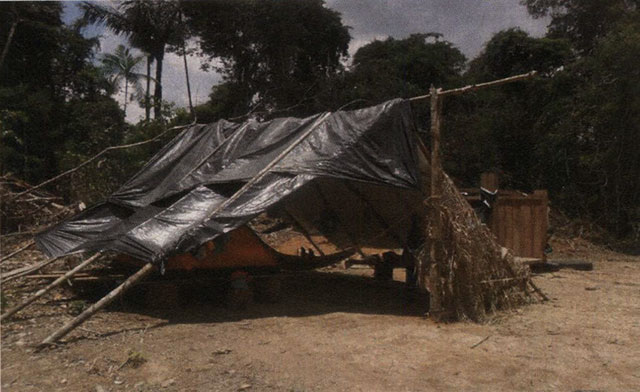
Honest, paywall-free news is rare. Please support our boldly independent journalism with a donation of any size.
This story was produced by Repórter Brasil through on-the-ground observations and interviews with local sources and labor inspectors during a one-year investigation of slave labor practices at logging camps in Pará, Brazil. Repórter Brasil’s Portuguese version of this story can be found here.
A rookie in the trade of cutting down trees, João* asked himself how life led him to this “terribly wrong” way to make ends meet. Camped out in the Brazilian Amazon rainforest in the state of Pará, 90 kilometers from the Trans-Amazonian Highway, João regretted taking the job, the first to come along in months.
He and his colleagues had finished cutting down the first of many massaranduba trees for the day when they heard the roar of cars. “Come on, let’s hide in the forest,” João heard from one of his more experienced colleagues, and followed. Peering through the leaves, they saw armed men appear clad in vests marked “Federal.”
“Oh God, get me out of here. Don’t let me die,” João pleaded as he ran further into the woods. His fear was rooted in stories told by his more-experienced colleagues, tales of how state authorities handle workers like him: with repression, prison and even physical violence.
After he was found by the inspectors, João said the idea of the state being there to protect him never crossed his mind. But this was, in fact, the goal of the team led by Ministry of Labor auditor José Marcelino and comprised of representatives of the Ministério Público do Trabalho (an independent branch of the Labor Justice Department), the Federal Public Defender’s Office and escorted by the Federal Highway Police. A team of journalists from Repórter Brasil also followed the team and interviewed the workers.
The operation was trying out a new strategy for bringing the law to the frontlines of rainforest destruction. Instead of treating workers as enemies, the idea was to recognize them as victims, even as possible allies in the fight against illegal logging.
When the group was finally found, João and his colleagues gave lengthy depositions, helping authorities understand how timber extraction works and unveiling myriad possible crimes committed by local sawmill owners. Because of the risks to their lives workers endured on the job and the degrading conditions in which they lived, the inspectors rescued the workers and framed the case as slave labor, in accordance with the Brazilian penal code.
João talked about how he would work from 6 a.m. to 6 p.m., off the books and without protective equipment. Even though logging is a risky activity, with one of the highest death and amputation rates in Brazil, neither guidance nor minimal protection was given. He described fatal accidents as banal events.
“There was this guy who did the same thing as me. He died. He got distracted while rolling up a cigarette. The tree fell off the truck and on top of him. He ended up in the cemetery,” João said.
Neither first aid nor medicine waited back at the communal tent. Just a rifle for protection and hunting. As well as an old motorbike to take the workers to the city, more than 100 kilometers on a dirt road away, in case of an animal attack or an accident. But workers did not count on the possibility of being rescued.
“There are no accidents over there, only death,” João said. “If you mess up, you’re all done for.”
João is a weathered worker with a long resume at some of the toughest jobs available for migrants like him.” He left a poor region in the northeast of Brazil still young and cut his teeth in construction sites and coal mines, where his lunges hurt when he coughed. Even so, he considered logging as his worst labor experience so far.
In the blue-tinged shadows of the tent, the workers had hung up their colored hammocks and backpacks with their belongings. Without walls and just a dirt floor, there was nothing kept out the cold morning wind or visiting insects and venomous snakes.
“Thank God everyone was already in their hammocks,” João said. “Then one of the men turned on their flashlight. There was a huge snake there, more than two meters long, thick. This guy grabbed a piece of wood and struck it on top, killing it.” Jaguars also occur in the area, with reporters observing tracks on the ground near camps.
With a nervous laugh, the group’s cook said she wasn’t scared and didn’t have anything to complain about. She described how she prepared meals on two camp stoves improvised from 18-liter cans. Rice, beans, and spaghetti were the most common meals, with occasional pieces of sun-dried beef that were hung to dry from a clothesline at the camp and frequently visited by flies. The camp water came from the city in barrels and, according to worker testimony, always had a little “grime on the bottom.”
The camp’s washtub was shielded by an impromptu partition made from palm leaves and a black tarp. The cook took her bath when the workers were in the forest. For all other necessities, the forest was the only bathroom.
Ministry of Labor raids have revealed that it is common for vulnerable workers in Brazil to experience serious labor violations, such as the ones described above. Based on the conditions at the camp, inspectors framed the case as slavery-like conditions in accordance with Brazilian legislation.
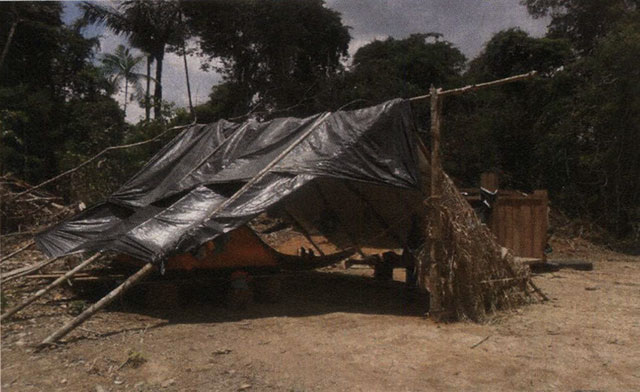 A tarp provides the only protection from the elements for the workers at this logging camp. (Photo: Lunaé Parracho)
A tarp provides the only protection from the elements for the workers at this logging camp. (Photo: Lunaé Parracho)
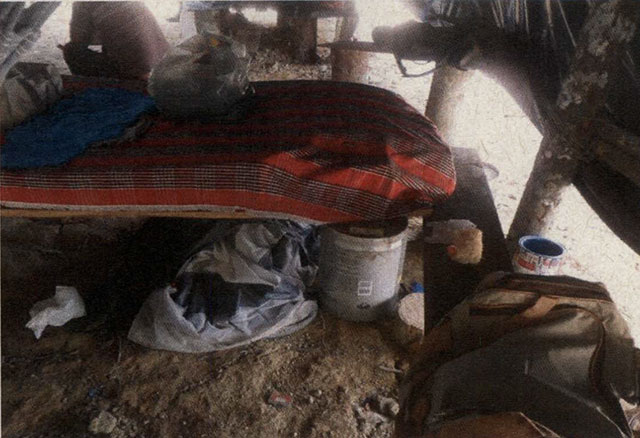 A bed at a logging camp. (Photo: Lunaé Parracho)
A bed at a logging camp. (Photo: Lunaé Parracho)
Ultimately, the Ministry of Labor found the sawmill company that operated the site, M.A. de Sousa Madeireira, responsible for the criminal conditions in which its employees worked and lived. However, in his dusty office in Uruará, company owner Manoel Araújo de Sousa asserted he was not responsible for the workers. He said he was aware of the extraction of wood, but he had nothing to do with the site’s operation since it was a self-directed effort by one of his former employees. He did admit, however, that he kept a portion of the harvested wood and that he was the “owner” of the land where they were working.
As proof that he could extract wood from the location, Araújo de Sousa claims to have a purchase contract, with no registered title or authorization for extracting timber.
As part of its penalty, M.A. de Sousa Madeireira had pay workers’ rights fees amounting to 31,000 reais ($9,950). The sawmill’s attorney declared her disagreement with the ruling holding the company responsible for the labor violations. Araújo de Sousa and his brother are allegedly working to raise the capital.
Crimes Against the Forest, Workers and Communities
Manoel de Sousa’s sawmill is a small fish in a sea of illegal activity operating in the region. The city of Uruará comprises one of the largest centers of expansion in the Amazon’s logging industry – and government investigations indicate illegal activities are growing more explicit.
Trucks without license plates carrying away loads of large native tree trunks are commonly seen entering the city by way of the Trans-Amazonian Highway.
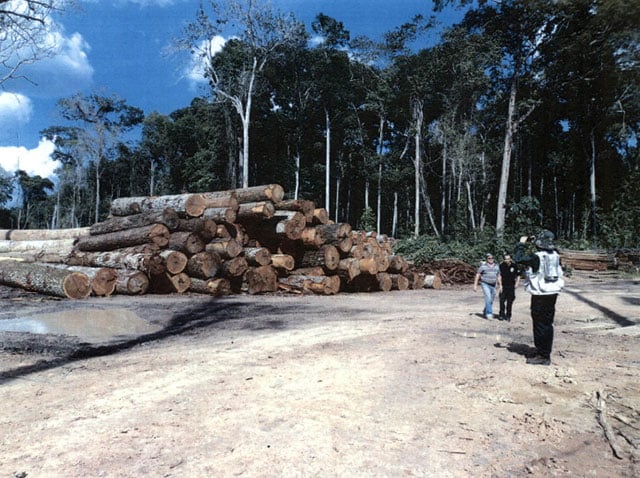 Timber harvested by workers at the logging camp. (Photo: Lunaé Parracho)
Timber harvested by workers at the logging camp. (Photo: Lunaé Parracho)
According to data from the Ministry of Labor and Pastoral Land Commission, 931 workers were rescued from slave labor conditions while harvesting trees from 2003 to 2016. A relationship between employment practices analogous to slave labor and some illegal logging operations in the Amazon was uncovered by a research led by the Integrated Action Network for Fighting Slavery. The study [link to report] indicates that the conditions endured by João and his colleagues may affect many workers in the sector.
Places like the logging camp from which João was rescued often do not appear on maps that track deforestation. This is because they engage in selective logging that causes changes in canopy coverage that aren’t large enough to be detected remotely. This illegal practice has been growing in the past few years, specifically because it outwits satellite monitoring, as shown by several studies conducted by Greenpeace and Instituto Socioambiental (ISA)
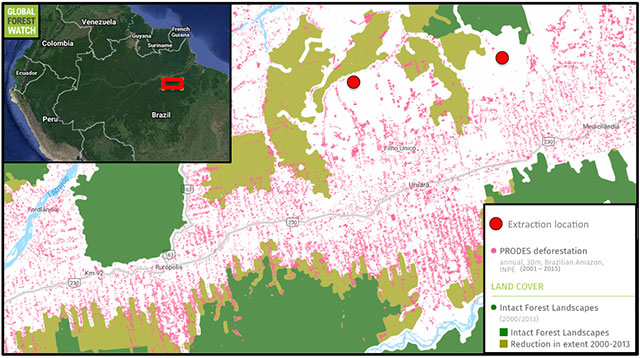 Satellite data from the Brazilian government show this area of Pará lost nearly 400,000 hectares of tree cover between 2001 and 2015. Small logging camps like that from which João and his colleagues add to this toll – but often log too selectively to show up via satellite monitoring.
Satellite data from the Brazilian government show this area of Pará lost nearly 400,000 hectares of tree cover between 2001 and 2015. Small logging camps like that from which João and his colleagues add to this toll – but often log too selectively to show up via satellite monitoring.
The illegal logging industry also takes specific measures to ensure the timber they extract isn’t traced back to where it was harvested. Previous investigations revealed that after the most market-valuable trees are cut down, the timber is taken to sawmills on trucks without license plates. At the sawmill, the illegal origin is “laundered” with handling documents that change the harvest location to legal sites.
In an area south of the Trans-Amazonian Highway, days before the operation that uncovered João and his colleagues, the same rescue team discovered small roads opened up by loggers within the Cachoeira Seca Indigenous Territory, where the Arara community lives. An indigenous group only recently contacted by the outside world, the Arara report hearing chainsaws and are avoiding hunting in portions of their land for fear of encountering loggers.
Along the makeshift logging roads within the indigenous territory, the inspectors and reporters saw logs piled up, swaths of scorched earth and tents just like the one João slept in – but they failed to locate any workers. When they came across someone on a motorbike going down the road, the inspectors were informed that they should give up in their search; the team’s presence had been made known through a radio system used by the loggers to communicate.
The practice of worker-exploitation in the illegal logging industry appears widespread. While the inspectors were processing João and his colleagues, the team discovered another case and rescued seven more workers cutting down trees in slave labor-analogous conditions. This time, the employer was Eudemberto Sampaio de Souza (no relation to Manoel Araújo de Sousa), owner of Betel sawmill, which was found responsible for labor crimes and required to pay compensation to its workers up to 50.000 reais ($15,800).
Sampaio de Souza, however, placed the blame squarely on the workers.
“We ask for the documents for each supposed employee,” he told Reporter Brasil. “They say that they’ve lost them, or don’t have them, or will se about it later. You ask for their name, they give you a nickname. Plenty are boozehounds, many are drug addicts. They are people who come out of states like Mato Grosso, Maranhão, Bahia, and Pernambuco. Nobody knows their story, nobody knows their past. Many times, by taking them out to work, it’s saving their lives.”
“Really Scared”
Days later, still more workers showed up at the hotel where the labor inspectors were staying. This time, the reports were heavier, mentioning death threats and the hiring of hit men to intimidate workers.
“We came here, but we are scared. Really scared,” said one of the men who knocked on the inspectors’ hotel door. His face ticked nervously as he talked about how his boss hired a gunman after he tried to collect his payment.
“If the end of the month comes and a lot is owed, they will send someone out to kill you. I’ve seen that happen. It was inside the city itself. He came to collect and they shot him. There’s plenty more stories like that.”
Other workers also noted not being paid for the job, and then being threatened when attempting to collect upon what they were owed.
“It’s better to pay three thousand for a gunman than five or six thousand to an employee,” said another man, quoting his boss.
The entities that reportedly hired gunmen are currently under investigation, and their names could not be released at the time of publication in the interest of the investigation and for the safety of those involved.
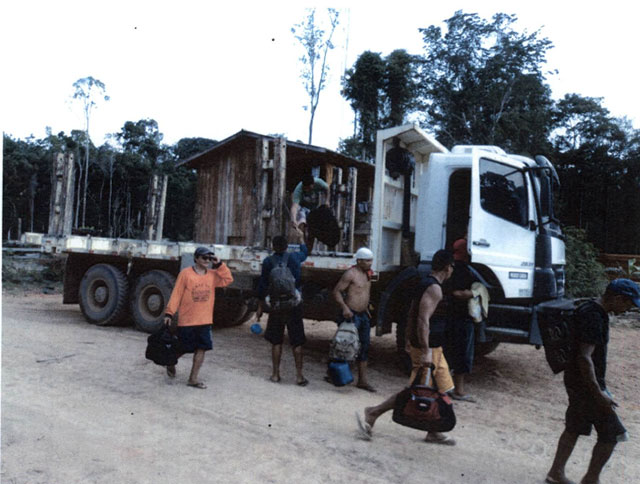 Officials arrive to extract the workers. (Photo: Lunaé Parracho)
Officials arrive to extract the workers. (Photo: Lunaé Parracho)
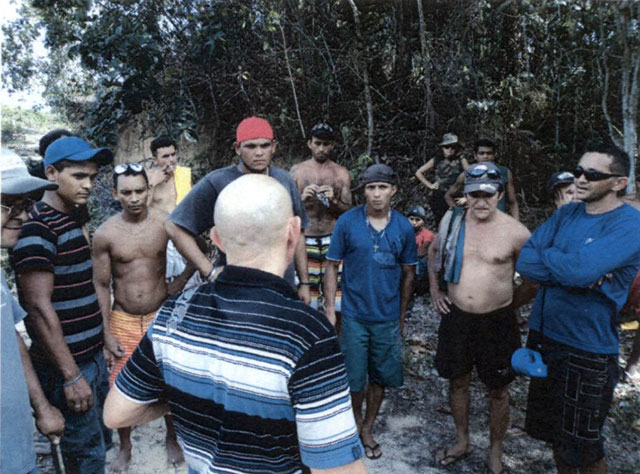 An auditor speaks to workers. (Photo: Lunaé Parracho)
An auditor speaks to workers. (Photo: Lunaé Parracho)
While the definition of slave labor in Brazil extends beyond lack of payment, this group of workers only recognized their situation when they weren’t paid. According to one of the men, “even today slavery hasn’t ended. It just modernized itself. Back in the day you would get beaten, nowadays you don’t. But you don’t get anything for all of your work.”
Another worker interviewed also alleged corruption of local authorities has had a role to play in illegal logging activities.
“The military police here is dangerous,” said one of the men. “They go to his sawmill and grab money, they grab wood, both the military and civil police. If any one of us turns one of them in to the police, it’s suicide.”
The workers also spoke of the total isolation of the logging camps and the impossibility of leaving them.
“On election day [2016 municipal elections], we spent five days out in the woods without food,” said one of the men who worked as a tractor driver. “They didn’t come out to get us to go vote, nobody came out.”
Another worker claims his employer forced him to remain on-site, and didn’t allow communication from the camp to the outside world.
“There isn’t even a way to go out and come back, because the boss won’t allow it. If you don’t stay in the forest for thirty days you lose the job. Only the boss will come over and pass along messages, see how things are. We only receive news,” said the man who has young children in the city of Uruará.
These complaints and the conditions discovered by investigations of logging camps have led to an ongoing investigation into slave labor in the logging sector. Ministry of Labor prosecuting attorney Allan Bruno, who was also part of the operation, received the cases and sent them along to the federal attorney general’s office, which is investigating the possible crimes of withholding salary, threatening lives, as well as for environmental, landholding, and tax issues.
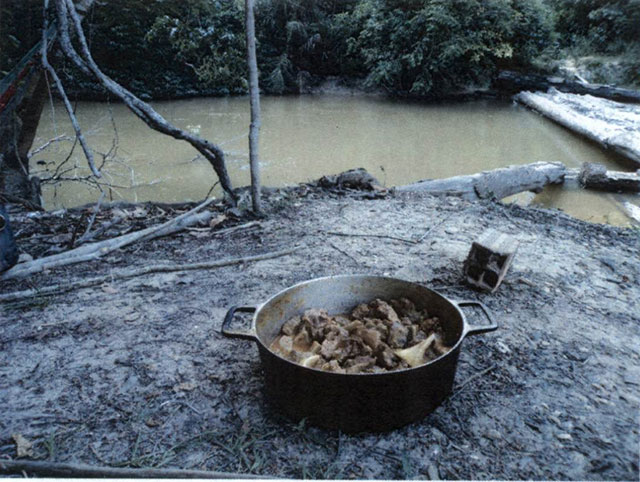 A meal at a logging camp in front of a stream that investigations reveal are often used for both drinking water and bathing. (Photo: Lunaé Parracho)
A meal at a logging camp in front of a stream that investigations reveal are often used for both drinking water and bathing. (Photo: Lunaé Parracho)
Auditor José Marcelino says labor inspectors are just beginning to understand how the illegal logging industry operates in the region. However, what is known is that it is a trade full of economic risk.
“Just cutting down the trees does not guarantee selling the wood,” Marcelino said. “And, since the entrepreneur doesn’t have adequate cash flow, he doesn’t meet the costs of paying the workers what they have the right to.”
This economic risk is coupled for the workers, who may have no choice but to resume working for these illegal operations. Even after receiving his compensation, João said he would go back into the woods, under the same conditions, if he could not arrange for other work in the following months.
*The names of the workers have been changed in an effort to avoid further violence as interviewees remain at risk.
A terrifying moment. We appeal for your support.
In the last weeks, we have witnessed an authoritarian assault on communities in Minnesota and across the nation.
The need for truthful, grassroots reporting is urgent at this cataclysmic historical moment. Yet, Trump-aligned billionaires and other allies have taken over many legacy media outlets — the culmination of a decades-long campaign to place control of the narrative into the hands of the political right.
We refuse to let Trump’s blatant propaganda machine go unchecked. Untethered to corporate ownership or advertisers, Truthout remains fearless in our reporting and our determination to use journalism as a tool for justice.
But we need your help just to fund our basic expenses. Over 80 percent of Truthout’s funding comes from small individual donations from our community of readers, and over a third of our total budget is supported by recurring monthly donors.
Truthout has launched a fundraiser, and we have a goal to add 182 new monthly donors in the next 24 hours. Whether you can make a small monthly donation or a larger one-time gift, Truthout only works with your support.